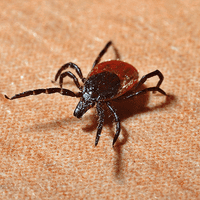You’ve probably noticed that the tick population has increased dramatically in recent years. As the numbers of ticks have gone up, so have cases of the diseases they can spread. Many of these, such as Lyme, can affect both people and pets. Read on as a local Roanoke, VA vet offers some information on keeping your pet safe from ticks.
Parasite Control
The first thing you’ll want to do is make sure that your furry buddy is current on their preventative care. There are several options to choose from, such as topical drops, collars, and sprays. Talk to your vet to make sure you’re picking the one that is best for you. Also, be sure to get these from your animal clinic or an approved retailer. Avoid buying them at box stores or through discount sellers.
Lawn Maintenance
Keeping up with your property maintenance can also go a long way here. Ticks like to lurk in tall grasses, so regularly mowing your yard will help. You’ll also want to keep shrubs trimmed back so they don’t touch your house.
Vacuuming
Vacuuming regularly isn’t going to hurt, either. This is very helpful if you are fighting fleas. It’s also a good way to keep the pet fur under control. We recommend doing high-traffic areas daily, and more thorough cleanings about once a week.
Gardening
Do you have a garden? You may want to address a few things there as well. Keep fallen produce picked up, as it can attract wild animals that carry ticks. It’s also best to keep birdfeeders away from your house a bit.
Sun
It’s worth mentioning that ticks are not big on bright lights. Putting a three-foot gravel border around your property will help quite a bit, particularly in areas that border woods or fields. Ticks often turn back at these borders, as they don’t like being exposed.
Pet Checks
Get into the habit of checking your canine pal for ticks, especially after he’s been in fields or wooded areas. Look between his toes and beneath his collar. If you do find a tick, use tweezers or a tick popper to remove it. You need to be sure to get the whole thing; if any pieces break off, they could cause infections.
Do you have questions about your pet’s flea and tick medication? Contact us, your local Roanoke, VA animal clinic, anytime.




